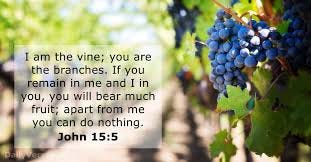Workers in the Vineyard: A Reflection on John 15
In the Gospel of John, chapter 15, Jesus uses the metaphor of the vineyard to illustrate the profound relationship between Himself, His followers, and God the Father. This passage, rich with symbolism and spiritual insight, provides a compelling narrative for understanding our roles as workers in God's vineyard.
The Vine and the Branches
John 15:1-8 begins with Jesus declaring, "I am the true vine, and my Father is the gardener." This powerful statement sets the stage for a deeper exploration of our connection to Christ and our purpose within His divine plan. The imagery of the vine and branches highlights the essential nature of our relationship with Jesus. As branches, we draw life and sustenance from the vine, symbolizing our dependence on Christ for spiritual vitality and growth.
Jesus emphasizes the necessity of remaining in Him, saying, "No branch can bear fruit by itself; it must remain in the vine. Neither can you bear fruit unless you remain in me" (John 15:4). This underscores the importance of a continual, abiding relationship with Christ. Just as branches cannot thrive or produce fruit without the vine, we too cannot fulfill our God-given purpose without staying connected to Jesus.
Pruning for Greater Fruitfulness
In the vineyard, the gardener's role is crucial. God, the gardener, tends to the vine with care and precision, pruning the branches to promote greater fruitfulness. Jesus explains, "He cuts off every branch in me that bears no fruit, while every branch that does bear fruit he prunes so that it will be even more fruitful" (John 15:2).
This process of pruning, though sometimes painful, is essential for our spiritual growth. It involves removing the aspects of our lives that hinder our ability to bear fruit for God's kingdom. Whether it is sin, unhealthy habits, or distractions, the pruning process refines us, making us more effective workers in the vineyard. It is through this divine pruning that we become more aligned with God's will and better equipped to serve His purposes.
Bearing Fruit that Lasts
As workers in the vineyard, our ultimate goal is to bear fruit that glorifies God. Jesus states, "This is to my Father’s glory, that you bear much fruit, showing yourselves to be my disciples" (John 15:8). The fruit we bear is not merely for our benefit but for the glory of God and the advancement of His kingdom. This fruit manifests in various forms: acts of love, kindness, service, and the spreading of the Gospel.
Moreover, Jesus promises that if we remain in Him and His words remain in us, we can ask whatever we wish, and it will be done for us (John 15:7). This assurance encourages us to pray and act boldly, knowing that our efforts, when aligned with God's will, will bear lasting fruit.
The Command to Love
In John 15:9-17, Jesus transitions from the metaphor of the vineyard to a direct command: "Love each other as I have loved you" (John 15:12). This command to love is the heart of our work in the vineyard. As we abide in Christ and bear fruit, our actions must be rooted in love. Jesus exemplified the greatest love by laying down His life for us, and He calls us to demonstrate this selfless love in our interactions with others.
The love we exhibit as workers in the vineyard is a testament to our discipleship. It is through love that we fulfill our calling and reflect the character of Christ to the world. Our labor in the vineyard is not just about producing fruit but also about cultivating an environment of love and compassion.
John 15 offers a profound vision of our roles as workers in God's vineyard. By remaining in Christ, enduring the pruning process, bearing fruit that glorifies God, and loving one another, we fulfill our divine purpose. As branches connected to the true vine, we are called to be fruitful and faithful stewards of the vineyard entrusted to us. Let us embrace this calling with joy and dedication, knowing that our labor in the vineyard is not in vain but is part of God's eternal plan.




